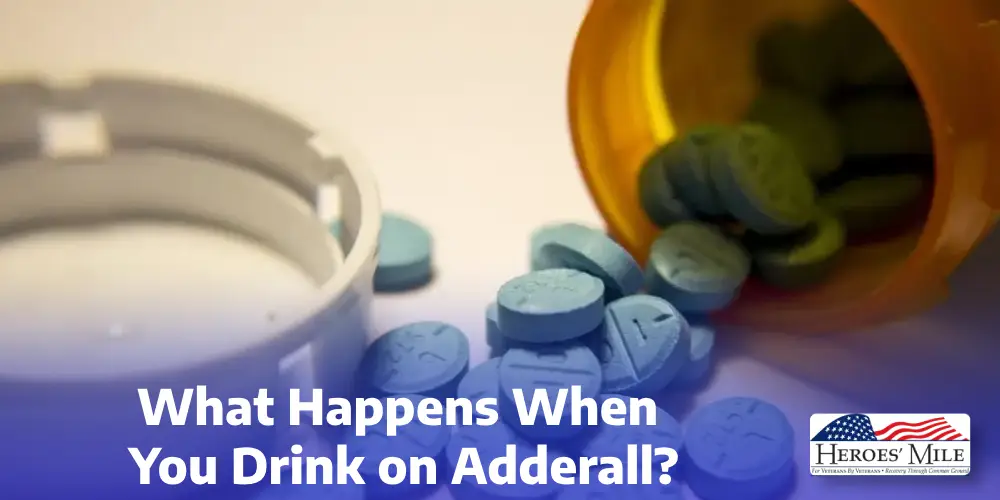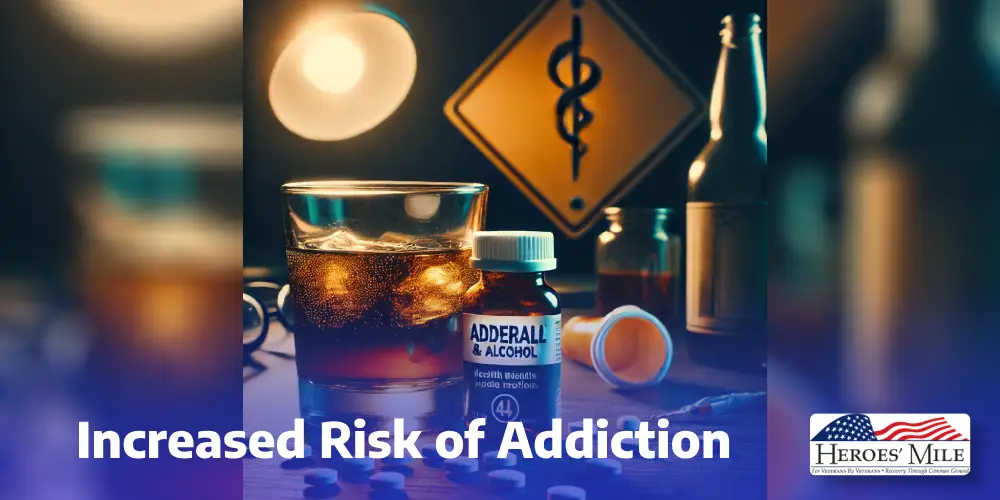Adderall is a common prescription medication used primarily to treat attention deficit hyperactivity disorder (ADHD). It is a mixture of amphetamine salts and acts as a stimulant on the central nervous system (CNS). Alternatively, alcohol is a depressant. Therefore, taking Adderall and alcohol together may send mixed signals to the body. But is it dangerous?
Simply put, Adderall and alcohol are not a good mix. Ultimately, the same can be said for most stimulant/depressant combinations. This is due to the opposing mechanisms of action that each drug inflicts on the body. When one substance tells the body to speed up and another tells it to slow down, there is a conflict of interest occurring within a person’s system that can cause elevated strain.
What Happens When You Drink on Adderall?

What Happens When You Drink on Adderall?
When taken alone, Adderall is known to reduce the symptoms of ADHD and promote focus among those who suffer from attention disorders. It does this by increasing certain chemicals in the brain, namely norepinephrine and dopamine. While this medication can be an effective tool for those in need of attention aids, this increase of the brain’s feel-good chemicals translates to a drug with high addiction potential. In fact, Adderall is a highly addictive drug that is often misused by people without a legitimate need for the medication. For example, Adderall use is popular among college students who are cramming for exams.
Alcohol, on the other hand, works to slow the body’s responses. Therefore, when Adderall and alcohol are combined, they are competing to manage how the body functions (this is also true for other ADHD medication combinations like Vyvanse and alcohol). Ultimately, consuming one drink on the same day as taking Adderall will not likely cause any problems. However, if drinking in excess, the result is a often dulled response to both substances. This means that the effects of alcohol may not be felt as strongly, and a person could unintentionally consume too much.
Other side effects of drinking on Adderall include:
- Alcohol poisoning from increased intake
- Dehydration
- Impaired decision making
- Irregular heartbeat
- High blood pressure
- Vision disturbances
- Dual addictions
Chronic conditions that can arise as a result of habitually mixing prescription stimulants with alcohol include heart disease and mental health disorders like depression. In fact, depression, anxiety, and other mental health disturbances may surface due to the changes in the brain that mixing Adderall and alcohol cause. These conditions could be a result of substance abuse alone, or the substances could act as triggers to reveal previously existing mental health conditions.
Increased Risk of Addiction

Increased Risk of Addiction
Both Adderall and alcohol are highly addictive substances. When taken over time, a person could develop a dual addiction, or addiction to more than one substance. It is well documented that individuals and active military personnel are at a heightened risk for substance abuse disorders. This is due in part to the physical and mental health conditions that must be managed on the fly.
For instance, demanding tasks are important and require unique skillsets. Due to this, individuals are often asked to push beyond physical limitations, and they may be given prescriptions to assist in staying comfortable. Usually, opioid pain pills are the type of medication distributed to treat injuries. However, Adderall is also given to counteract conditions like fatigue. Once prescriptions are no longer needed, they may follow individuals into their daily lives and contribute to elevated rates of substance abuse. Fortunately, substance abuse programs offer effective drug and alcohol rehab to those in need of addiction help.
Video
Telehealth executives charged in Adderall distribution scheme – NBC News
Federal prosecutors say executives from the telehealth company Done conspired to illegally distribute the ADHD medication Adderall through online prescriptions.
Podcast
How The American Workforce Got Hooked on Adderall – Apple Podcasts
Over the last few years, users of the popular ADHD drug Adderall have been frustrated by regular shortages in getting their prescriptions filled. Various regulatory and supply chain factors have contributed to the inability of producers to keep up with demand. But this raises the question: why is there so much demand in the first place? How did a significant chunk of the labor force — from tech workers to Wall Streeters — begin using the drug as an aid for their work and everyday lives? On this episode of the podcast, we speak with Danielle Carr, an assistant professor at the Institute for Society and Genetics at UCLA, who studies the history of politics of neuroscience and psychology. We discuss the history of this medicine and related medicines, what it does for the people who take it, and how market forces opened the drug up to almost anyone.
FAQ
- Why is mixing Adderall and alcohol dangerous?
Combining Adderall, a stimulant, with alcohol, a depressant, can mask alcohol’s sedative effects, increasing the risk of alcohol poisoning. - What are the short-term side effects of combining Adderall and alcohol?
Short-term effects include dehydration, increased heart rate, high blood pressure, and impaired decision-making. - Can mixing Adderall and alcohol cause long-term health problems?
Yes, it may lead to heart problems, liver damage, addiction, and mental health issues. - What should I do if I accidentally mixed Adderall and alcohol?
Seek medical attention immediately, especially if you experience chest pain, confusion, or difficulty breathing. - Is it safe to drink alcohol while prescribed Adderall?
It’s best to avoid alcohol while taking Adderall, as the combination can pose significant health risks.
